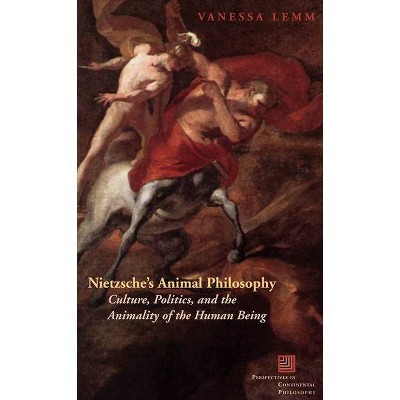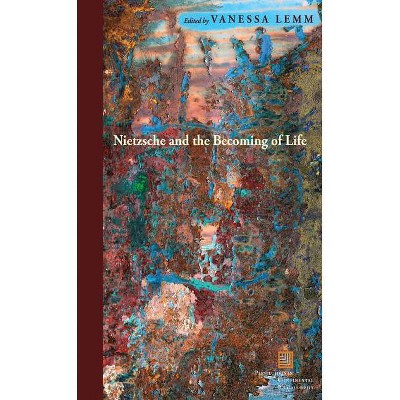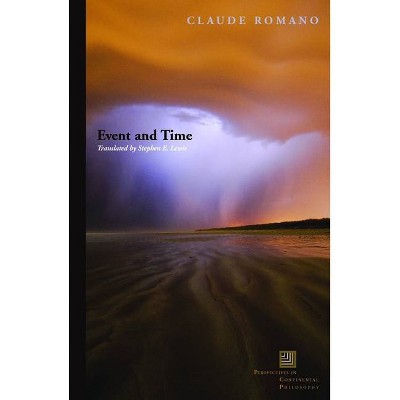Nietzsche's Animal Philosophy - (Perspectives in Continental Philosophy) by Vanessa Lemm (Paperback)

Similar Products
Products of same category from the store
AllProduct info
<p/><br></br><p><b> Book Synopsis </b></p></br></br><p>This book explores the significance of human animality in the philosophy of Friedrich Nietzsche and provides the first systematic treatment of the animal theme in Nietzsche's corpus as a whole Lemm argues that the animal is neither a random theme nor a metaphorical device in Nietzsche's thought. Instead, it stands at the center of his renewal of the practice and meaning of philosophy itself. Lemm provides an original contribution to on-going debates on the essence of humanism and its future. <p/>At the center of this new interpretation stands Nietzsche's thesis that animal life and its potential for truth, history, and morality depends on a continuous antagonism between forgetfulness (animality) and memory (humanity). This relationship accounts for the emergence of humanity out of animality as a function of the antagonism between civilization and culture. <p/>By taking the antagonism of culture and civilization to be fundamental for Nietzsche's conception of humanity and its becoming, Lemm gives a new entry point into the political significance of Nietzsche's thought. The opposition between civilization and culture allows for the possibility that politics is more than a set of civilizational techniques that seek to manipulate, dominate, and exclude the animality of the human animal. By seeing the deep-seated connections of politics with culture, Nietzsche orients politics beyond the domination over life and, instead, offers the animality of the human being a positive, creative role in the organization of life. Lemm's book presents Nietzsche as the thinker of an emancipatory and affirmative biopolitics. <p/>This book will appeal not only to readers interested in Nietzsche, but also to anyone interested in the theme of the animal in philosophy, literature, cultural studies and the arts, as well as those interested in the relation between biological life and politics.</p><p/><br></br><p><b> Review Quotes </b></p></br></br><br>. . . Convincingly reveals the positive political core of Nietzsche's work and successfully moves it beyond his own epch, highlighting its relevance for the twenty-first century.-- "--Foucault Studies"<br><br>[For] anyone who is brave enough to open up and embrace the question of animality in the face of contemporary problems.-- "--The Agonist"<br><br>[Lemm] consolidates her reputation as one of Nietzsche's most original, attentive, and lively readers.-- "--Journal of Nietzsche Studies"<br><br>Lemm offers a fresh and ultimately persuasive interpretation of several of Nietzsche's core concepts, including culture, civilization, morality, freedom, and truth . . . Simply put, this is a must-read for Nietzsche scholars. Highly recommended.-- "--Choice"<br><br>Lemm's important contribution lies in complicating Nietzsche's political theory, in distinguishing between a politics of civilization and of culture.-- "--Perspectives on Politics"<br><br>Vanessa Lemm's Nietzsche's Animal Philosophy is an important contribution to the debate about the animality of human life. Deeply scholarly and rigorous, Lemm's book points to the centrality of the animal in Nietzsche and will be an important resource for those seeking to understand the breadth and passion of Nietzsche's writings on life, art, and creativity.-- "--Theory & Event"<br><p/><br></br><p><b> About the Author </b></p></br></br><br><strong>VANESSA LEMM</strong> is Full Professor in Philosophy at the School of Humanities of the University of New South Wales in Sydney. She is also full professor and recurrent visiting professor at the Institute of Humanities at the Diego Portales University in Santiago de Chile. Last year she taught as a DAAD guest professor at the Institute of Philosophy at the University of Potsdam, Germany.<br>
Price History
Price Archive shows prices from various stores, lets you see history and find the cheapest. There is no actual sale on the website. For all support, inquiry and suggestion messages communication@pricearchive.us



















